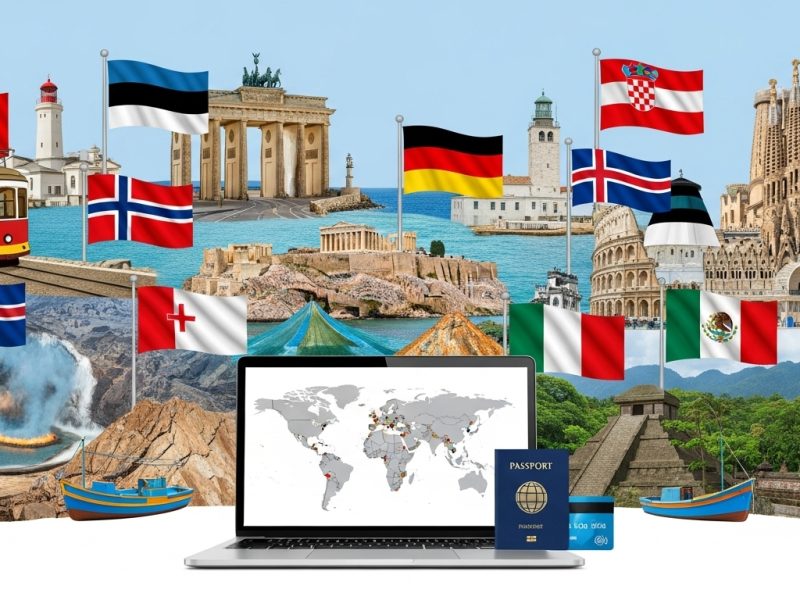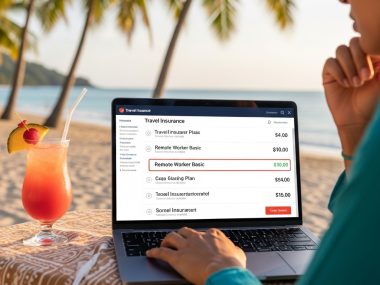The Digital Nomad Revolution: Embracing Location Independence
The global workforce has undergone a remarkable transformation in recent years. What began as a necessary response to pandemic restrictions has evolved into a fundamental shift in how and where we work. With advancements in technology and connectivity, millions of professionals have embraced remote work, trading traditional offices for the freedom to work from anywhere. This seismic shift has given rise to the digital nomad lifestyle, where location independence is no longer a distant dream but an achievable reality.
This comprehensive guide will explore the best digital nomad visa countries in 2025, application processes, financial considerations, and compliance with advertising policies to help you create content that ranks well and drives revenue.
What is a Digital Nomad Visa and Why Does It Matter?
A digital nomad visa is a specialized residence permit that allows remote workers, freelancers, and entrepreneurs to legally live and work in a foreign country while maintaining employment with companies or clients located outside that country . Unlike traditional work visas that require local sponsorship, digital nomad visas recognize the nature of location-independent work and provide a legal framework to support it.
Key benefits of digital nomad visas include:
-
Legal compliance: Work remotely without violating immigration laws or visa terms.
-
Extended stays: Reside in destinations for 6-24 months versus typical 30-90 day tourist limits.
-
Access to services: Open bank accounts, secure housing, and sometimes access healthcare systems.
-
Tax advantages: Some countries offer tax exemptions or favorable rates for qualifying nomads.
-
Cultural immersion: Experience living as a local rather than as a short-term tourist.
Top Digital Nomad Visa Countries in Europe for 2025
Europe remains the most popular destination for digital nomads, offering excellent infrastructure, rich cultural experiences, and diverse landscapes. The following table highlights the leading European digital nomad visa programs available in 2025:
| Country | Visa Name | Minimum Income | Duration | Key Benefits |
|---|---|---|---|---|
| Portugal | Temporary Stay Visa / D8 Visa | €3,480/month | 1 year (renewable) | Path to permanent residency, vibrant digital nomad communities |
| Spain | Digital Nomad Visa | €2,300-€2,760/month | 1 year (renewable up to 5 years) | 20% special tax rate, family inclusion allowed |
| Italy | Remote Worker Visa | €2,500-€2,700/month | 1 year (renewable) | Recent 2024 launch, special tax incentives, Mediterranean lifestyle |
| Croatia | Digital Nomad Residence Permit | €2,300-€3,295/month | Up to 1 year (with possibility to extend) | No local income tax on foreign earnings, beautiful Adriatic coastline |
| Greece | Digital Nomad Visa | €3,500/month | 1 year (renewable up to 2 years) | 50% tax break for first 7 years, affordable cost of living |
| Estonia | Digital Nomad Visa | €3,500/month | 1 year | First country to launch digital nomad visa, advanced e-residency program |
Notable European mentions include Germany’s Freelancer Visa (requiring proof of self-sufficiency and client contracts) , Malta’s Nomad Residence Permit (offering an English-speaking environment with no local taxes if income is taxed elsewhere) , and Montenegro’s new digital nomad visa program launched in 2024 with relatively low income requirements of approximately €1,350/month.
Digital Nomad Visa Opportunities Beyond Europe
While Europe dominates the digital nomad landscape, exciting opportunities exist across other continents:
Asia and Middle East
-
Dubai, UAE: One-year remote work visa requiring $3,500-$5,000/month income with the significant benefit of no income taxes.
-
Japan: New Digital Nomad Visa launched in 2024, allowing six-month stays for high earners (10 million JPY/annual income) from specific countries.
-
Thailand: Long-Term Resident (LTR) visa with special tax perks and access to established digital nomad communities.
-
Malaysia: DE Rantau Nomad Pass offering opportunities to experience Southeast Asian culture while working remotely.
The Americas
-
Mexico: Temporary Resident Visa valid for up to four years with relatively accessible income requirements.
-
Panama: Short-Stay Remote Worker Visa valid for 9 months (extendable once) with $3,000/month minimum income and no income tax on foreign earnings.
-
Costa Rica: Digital Nomad Visa offering one-year stays (with possible extension) and no tax requirements for remote workers.
-
Brazil: Digital Nomad Visa program attracting remote workers to its vibrant cities and beautiful landscapes.
Caribbean and Other Regions
-
Barbados: Welcome Stamp visa that established the blueprint for many subsequent digital nomad programs.
-
Cabo Verde: Remote Working Program attracting nomads to its island settings.
-
South Africa: Recently introduced Digital Nomad Visa offering access to diverse landscapes and affordable living costs.
The Digital Nomad Visa Application Process: A Step-by-Step Guide
Successfully obtaining a digital nomad visa requires careful planning and preparation. Follow this structured approach to navigate the process efficiently:
-
Select Your Destination Carefully: Choose a country aligned with your budget, time zone preferences, lifestyle needs, and work requirements. Consider factors like cost of living, internet reliability, community infrastructure, and climate.
-
Verify Eligibility and Requirements: Each country maintains specific criteria. Generally, you’ll need to provide:
-
Proof of stable remote income (typically ranging from $2,000-$5,000+ monthly).
-
Valid health insurance with coverage in your destination country.
-
Clean criminal record from your home country.
-
Proof of accommodation arrangements.
-
Valid passport with sufficient blank pages.
-
-
Prepare Your Documentation Meticulously: Compile all required documents, which commonly include:
-
Completed application forms.
-
Passport-sized photographs.
-
Passport copies.
-
Remote employment verification or business registration documents.
-
Bank statements showing consistent income.
-
Health insurance certification.
-
Clean criminal record report.
-
-
Submit Your Application: Depending on the country, you may apply online, through an embassy or consulate in your home country, or sometimes after arrival in the destination country . Note that some applications require in-person interviews.
-
Await Approval and Plan Your Move: Processing times vary significantly from a few weeks to several months . Use this time to research housing, connect with local communities, and prepare for your transition.
Understanding Tax Implications and Financial Considerations
The tax situation for digital nomads varies considerably between countries and requires careful attention:
-
Tax-Free Destinations: Several countries, including Croatia, Costa Rica, Panama, and Dubai, offer complete exemption from local income tax for digital nomad visa holders.
-
Tax-Incentive Programs: Some European countries provide special tax regimes to attract remote workers. Spain offers a reduced 24% flat tax rate on income up to €600,000 for qualifying digital nomads, while Greece provides a 50% income tax reduction for the first seven years.
-
Tax Residency Triggers: Most countries consider you a tax resident if you spend 183 days or more in their territory during a calendar year . This may require filing tax returns in both your home and host countries, though many nations have double taxation agreements to prevent paying taxes twice on the same income.
-
Ongoing Home Country Obligations: Don’t assume leaving your home country eliminates your tax responsibilities. Countries like the United States tax citizens regardless of residence, though exclusions may apply to foreign-earned income.
Consult with a qualified international tax professional before making decisions about your tax situation, as laws change frequently and have complex implications.
Conclusion: Embracing the Digital Nomad Lifestyle in 2025
The expansion of digital nomad visa programs represents a fundamental shift in how countries view remote work and international mobility. For location-independent professionals, these visas offer unprecedented opportunities to legally live and work in desirable destinations worldwide. The programs highlighted in this guide provide excellent starting points for your nomadic journey, whether you seek European culture, Asian adventure, or Caribbean relaxation.
As you consider your options, remember that thorough research and careful planning significantly increase your chances of a successful application. Pay particular attention to financial requirements, tax implications, and documentation needs specific to your chosen destination.
The digital nomad movement continues to evolve, with new programs launching regularly. Stay informed about developments in this dynamic space, and join communities of like-minded individuals who can provide support and share experiences. With the right preparation, you can leverage these digital nomad visa programs to create the location-independent lifestyle you desire in 2025 and beyond.
Disclaimer:
This article provides general information only and does not constitute legal, financial, or immigration advice. Visa requirements, income thresholds, and tax regulations change frequently and vary by individual circumstances. Always consult with qualified immigration attorneys, tax professionals, and official government sources before making decisions regarding digital nomad visas or international relocation. The author and publisher are not liable for any actions taken based on the information contained in this article.






